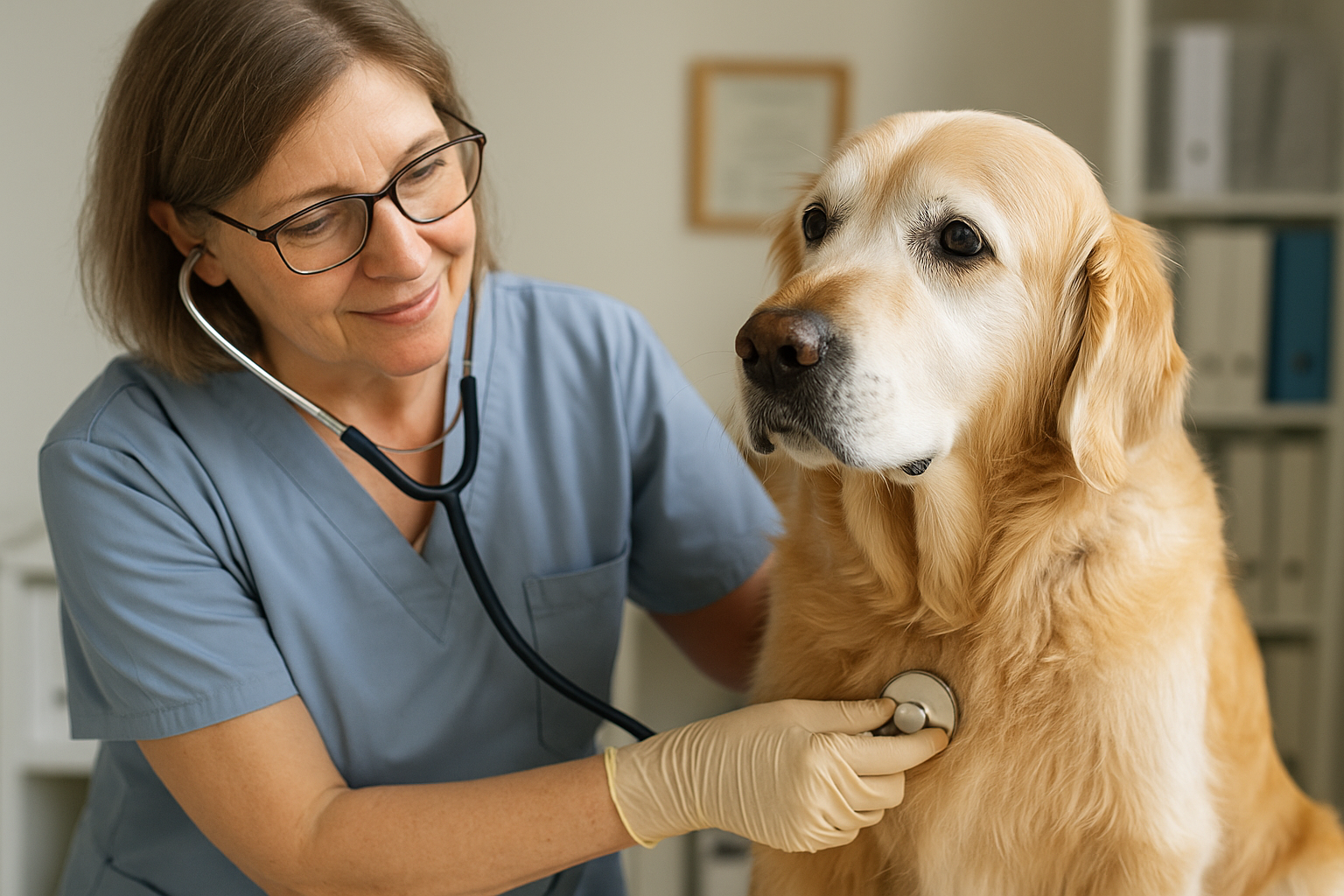À medida que os cães envelhecem, suas necessidades de saúde se tornam mais complexas – e às vezes menos visíveis. Enquanto um cão jovem e enérgico pode se recuperar rapidamente da doença ou mostrar sinais claros de dor, os cães seniores geralmente sofrem em silêncio.
É por isso que os check -ups veterinários regulares são uma das ferramentas mais poderosas para garantir que seu cão envelhecido vive uma vida mais longa, saudável e mais confortável. Neste guia, vamos quebrar Por que as visitas frequentes do veterinário são tão essenciais, o que esperar durante um exame de bem -estar sênior e como se preparar.
Por que os cães seniores precisam de visitas veterinárias mais frequentes
A maioria dos veterinários recomenda que os cães seniores visitem o veterinário pelo menos duas vezes por ano. Isso ocorre porque muitas condições comuns em cães mais velhos se desenvolvem lentamente e sem sintomas óbvios – até que é tarde demais.
Alguns dos problemas mais frequentes em mais antigos Os cães incluem:
Problemas de artrite e mobilidade
Doença dentária
Disfunção renal ou fígado
Câncer
Diabetes
Disfunção cognitiva (demência canina)
Doença cardíaca
Visão e perda auditiva
Quanto mais anteriores essas condições forem detectadas, mais fáceis de gerenciar – e em alguns casos, até reverter.
Quando um cachorro é considerado “sênior”?
A definição de “sênior” depende da raça e tamanho do cachorro:
Pequeno raças (<20 libras): 10-12 anos Raças médias (20 a 50 libras): 8 a 10 anos Raças grandes (> 50 libras): 6-7 anos
Isso significa que um labrador pode ser considerado sênior aos 7 anos, enquanto um Chihuahua pode não chegar a esse estágio até os 11 ou 12 anos.
Benefícios dos exames veterinários semestrais para cães mais velhos
- Detecção precoce de doença
Seu cão pode não mostrar sinais de doença até que se torne sério. Testes de rotina podem assistir:
Órgão falha
Tumores ou crescimentos
Infecções internas
Desequilíbrios hormonais (como hipotireoidismo)
- Monitorando as condições contínuas
Se o seu cão já tiver artrite, doença renal ou outro problema crônico, os exames regulares ajudam a monitorar a progressão e a ajustar os tratamentos. - Gerenciamento da dor
Muitos cães sofrem de dor nas articulações, mas escondem -a. Os veterinários são treinados para detectar sinais sutis e prescrever:
Anti-inflamatório medicamentos
Suplementos
Opções de fisioterapia
- Apoio à saúde dental
Mais de 80% dos cães seniores sofrem de doença dentária, o que pode levar a:
Perda de dente
Infecções de gengiva
Danos aos órgãos de bactérias que entram na corrente sanguínea
- Orientação nutricional
Seu veterinário pode recomendar:
Ajustes na ingestão de calorias
Dietas prescritas para condições específicas
Suplementos para articulações, cognição e digestão
O que Acontece durante um exame de bem -estar sênior?
Um exame de bem -estar sênior é mais completo do que um check -up padrão. Aqui está o que geralmente inclui:
- Exame físico completo
Seu veterinário vai verificar:
Peso e condição corporal
Tônus muscular e mobilidade articular
Sons de coração e pulmão
Olhos e ouvidos para nebulosidade ou descarga
Dentes e gengivas para tártaro ou infecção
Condição de pele e revestimento
Quaisquer novos caroços ou crescimentos
- Bloodwork
Um Das ferramentas mais importantes nos cuidados de idosos, os exames de sangue ajudam a identificar:
Função de rim e fígado
Níveis de açúcar no sangue (diabetes)
Equilíbrio hormonal da tireóide
Contagem de glóbulos brancos e vermelhos
Infecções ou inflamação
Esta linha de base é vital para uma comparação futura.
3
Os testes de urina revelam:
Infecções da bexiga
Problemas renais
Perda de proteínas
Sinais de diabetes
Muitas condições aparecem na urina antes dos sintomas surgir.
- Teste fecal
Verificação de parasitas ou sinais de inflamação intestinal, especialmente se o seu cão tiver diarréia, constipação ou perda de peso. - Raios-X ou imagem (se necessário)
Se o seu veterinário perceber um sinais mancos, tosse ou outros sinais anormais, eles podem recomendar:
Raios X de peito ou abdominal
Ultrassom para órgãos internos
Imagem conjunta para avaliar artrite ou lesões
Estes não são invasivos e frequentemente feito no mesmo dia.
Como se preparar para uma visita veterinária sênior
Estar preparado ajuda você a aproveitar ao máximo sua visita. Aqui está como:
- Traga um registro de sintomas
Rastreie quaisquer comportamentos incomuns como:
Mudanças no apetite ou sede
Inquietação ou dormindo demais
Mancando ou evitando escadas
Acidentes em casa
Tossir ou chiar
Confusão ou desorientação
- Traga uma lista de medicamentos e suplementos
Incluir:
Prescrições
Em cima do balcão remédios
Vitaminas ou remédios à base de plantas
Dietas especiais
Isso evita interações e garante tratamento adequado.
- Nota mudanças ambientais
Conte ao seu veterinário sobre qualquer:
Viagens recentes
Novos animais de estimação em casa
Mudanças na rotina
Mudanças na dieta
- Colete uma amostra de fezes ou urina (se possível)
Pergunte ao seu veterinário se eles preferem amostras com antecedência e como armazená -las.
Perguntas para fazer seu veterinário durante um check -up sênior
Não Tenha medo de falar! Perguntas importantes incluem:
Meu cachorro está com um peso saudável para a idade deles?
O que devo alimentá -los agora?
Existem sinais de dor ou desconforto?
Que suplementos ajudariam nesta fase?
Devemos considerar o diagnóstico imagens?
Como faço para dizer se a qualidade de vida deles está diminuindo?
Quando devo voltar para o próximo exame?
Serviços adicionais que apóiam a saúde sênior de cães
Muitos As clínicas oferecem extras que podem fazer uma grande diferença:
Terapia a laser para alívio da dor
Fisioterapia para melhoria de mobilidade
Acupuntura para apoio e ansiedade conjunta
Limpeza dentária sob anestesia
Painéis de sangue sênior (pacotes de diagnóstico personalizado)
Pergunte o que está disponível no seu veterinário ou se for necessária uma indicação local.
Como pagar um atendimento regular para cães
Preocupado com o custo? Você não está sozinho. Aqui são algumas soluções:
Seguro para animais de estimação: alguns planos cobrem exames sênior e cuidados crônicos de doenças
Planos de bem -estar: oferecidos por muitas clínicas para espalhar custos mensalmente
Clínicas de baixo custo: algumas comunidades oferecem taxas reduzidas para idosos ou renda fixa
Cuidados preventivos: os exames regulares podem evitar emergências caras no caminho
Por fim, o investimento em cuidados de rotina veterinário economiza dinheiro e evita o sofrimento no a longo prazo.
E se meu cachorro odeia o veterinário?
Cães seniores podem ser mais ansiosos ou sensíveis. Para ajudar:
Traga guloseimas favoritas ou um cobertor de conforto
Use um spray de feromônio calmante antes da visita
Programe a primeira nomeação do dia para obter mais curtos tempos de espera
Pratique passeios de carro curto de antemão
Pergunte sobre remédios anti-ansiedade se as visitas são severamente estressantes
Algumas clínicas até oferecem exames em casa ou veterinário móvel Serviços para cães sensíveis.
Pensamentos finais: faça parceria com seu veterinário para prolongar a vida do seu cão
Você conhece melhor o seu cão – mas seu veterinário tem as ferramentas, o treinamento e a visão para ver o que você não pode. Os cães seniores confiam nessa poderosa parceria entre o veterinário e o proprietário para viver seus últimos anos com tanta alegria, mobilidade e conforto quanto possível.
As visitas regulares ao veterinário não são apenas sobre prevenção de doenças – elas são sobre dar ao seu cão a dignidade do envelhecimento com cuidado, o conforto da atenção personalizada e o presente de mais bons dias ao seu lado.













